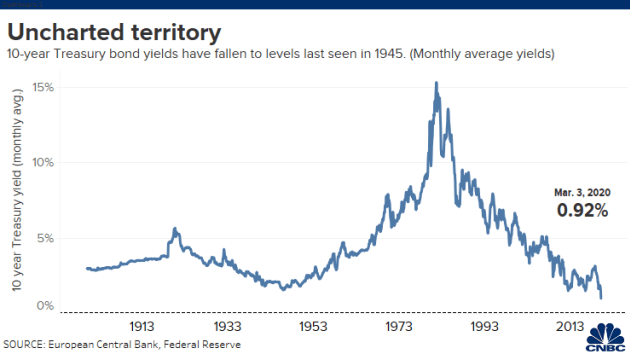Global coronavirus cases nears 100,000: NY Times
Cruise ship in limbo off Calif. coast awaits coronavirus results: CNN
Russia and Turkey announce deal to end attacks in Syria: NY Times
OPEC seeks large cut in oil production to deal with coronavirus: Reuters
Bonds and gold rally as stocks sink as risk-off trade resumes: WSJ
Announced job cuts in US fell 16% in Feb. from previous month: CG&C
US jobless claims remain low–no sign yet of coronavirus impact: MW
US factory orders dropped more than expected in January: Reuters
10-yr Treasury yield falls under 0.8% in early Friday trading–a record low:
Should You React To The Surge In Stock Market Volatility?
The coronavirus that’s roiling world markets and raising questions about the economic outlook has triggered a familiar shock to stocks: higher volatility. Is this a reason to change your asset allocation, rebalance the portfolio or modify risk management decisions? Maybe, but maybe not. There is no generic answer for everyone because every investor is different due to risk tolerance, time horizon, investment objectives, and so on. But while customized advice and analysis isn’t appropriate here, it can’t hurt to review some basic points for volatility as a risk metric.
Macro Briefing | 5 March 2020
Considering the case for why the Fed may cut rates again: WSJ
California declares state of emergency due to coronavirus: Reuters
Opec expected to call for big cut in oil production to counter falling prices: CNBC
Global economy contracted in February, according to survey data: IHS Markit
Coronavirus impact on US economy shows up in Fed Beige Book reoprt: MW
US services sector growth picked up in Feb via ISM Non-Mfg Index: ISM
US Services PMI shows mild contraction in Feburary: IHS Markit
US private hiring slowed in Feb but continued to rise at healthy pace: ADP
Fed Cuts Rates As Global Coronavirus Risk Continues To Rise
It’s unclear if yesterday’s emergency 50-basis-point cut in interest rates by the Federal Reserve will help immunize the US economy against coronavirus-related blowback. Meanwhile, a rise in reported cases of covid-19 on a global basis remains the baseline forecast, based on today’s update of CapitalSpectator.com’s modeling (see today’s revised outlook below).
Macro Briefing | 4 March 2020
Joe Biden enjoys stunning comeback in Super Tuesday voting: CNN
Fed cuts target interest rate by 1/2 point to combat coronavirus: CNBC
China services economy effectively ground to a half in Feb: IHS Markit
Japan slipped into recession in February via PMI survey data: IHS Markit
Eurozone shows a bit of resilience with modest growth in Feb: IHS Markit
10-year Treasury yield falls under 1.0%–a new record low: CNBC
Risk Premia Forecasts: Major Asset Classes | 3 March 2020
The Global Market Index (GMI) is expected to earn an annualized risk premium of 4.5% over the long run in today’s revised estimate (before factoring in a “risk-free” rate). The new projection reflects a downgrade from last month’s 5.0% forecast and no change from the year-ago estimate.
Macro Briefing | 3 March 2020
World finance officials consider economic response to coronavirus: Reuters
World’s top-3 central banks look set to respond to coronavirus: Reuters
World Health Organization chief: we’re in “uncharted territory”: CNN
Global manufacturing sector fell into deep recession in February: IHS Markit
US construction spending rose in January to record level: AP
US Mfg PMI: modest growth continued to weaken in February: IHS Markit
US manufacturing sector barely expanded in February via ISM survey data: ISM
Major Asset Classes | February 2020 | Performance Review
Nearly every corner of the major asset classes took a beating in February, courtesy of coronavirus-related worries. Only investment-grade US bonds, US inflation-indexed government bonds and cash bucked the risk-off sentiment. Otherwise, red ink swept across markets near and far.
Continue reading
Macro Briefing | 2 March 2020
OECD: Covid-19 is biggest threat to global economy since financial crisis: OECD
A degree of calm returns to Asian markets on Monday: Reuters
Syria’s war escalates as Turkey responds to attack with drone strikes: BBC
Greece ends asylum as migrants mass on its border with Turkey: NY Times
North Korea fires two missiles into Sea of Japan: CNN
US and Taliban sign deal to end 18-year war in Afghanistan: BBC
Caixin China General Manufacturing PMI crashed in February: IHS Markit
Eurozone mfg recession eased in Feb but Covid-19 weighs on outlook: IHS Markit
US consumer spending slowed in January: Reuters
US Consumer Sentiment Index rose in February, near post-recession high: UoM
Chicago PMI edged up in Feb but still below neutral 50 mark: Chicago PMI
Comparing last week’s stock market loss with previous 5-day declines: CNBC
Book Bits | 29 February 2020
● The Long Deep Grudge: A Story of Big Capital, Radical Labor, and Class War in the American Heartland
By Toni Gilpin
Summary via publisher (Haymarket Books)
This rich history details the bitter, deep-rooted conflict between industrial behemoth International Harvester and the uniquely radical Farm Equipment Workers union. The Long Deep Grudge makes clear that class warfare has been, and remains, integral to the American experience, providing up-close-and-personal and long-view perspectives from both sides of the battle lines. International Harvester – and the McCormick family that largely controlled it – garnered a reputation for bare-knuckled union-busting in the 1880s, but in the 20th century also pioneered sophisticated union-avoidance techniques that have since become standard corporate practice. On the other side the militant Farm Equipment Workers union, connected to the Communist Party, mounted a vociferous challenge to the cooperative ethos that came to define the American labor movement after World War II.
Continue reading





